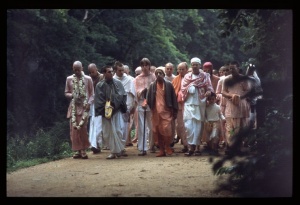CC Madhya 21.53: Difference between revisions
m (1 revision(s)) |
No edit summary |
||
| Line 1: | Line 1: | ||
{{ | [[Category:Sri Caitanya-caritamrta - Madhya-lila Chapter 21|C053]] | ||
<div style="float:left">'''[[Sri Caitanya-caritamrta|Śrī Caitanya-caritāmṛta]] - [[CC Madhya|Madhya-līlā]] - [[CC Madhya 21|Chapter 21: The Opulence and Sweetness of Lord Śrī Kṛṣṇa]]'''</div> | |||
<div style="float:right">[[File:Go-previous.png|link=CC Madhya 21.52|Madhya-līlā 21.52]] '''[[CC Madhya 21.52|Madhya-līlā 21.52]] - [[CC Madhya 21.54|Madhya-līlā 21.54]]''' [[File:Go-next.png|link=CC Madhya 21.54|Madhya-līlā 21.54]]</div> | |||
{{CompareVersions|CC|Madhya 21.53|CC 1975|CC 1996}} | |||
{{RandomImage}} | |||
==== TEXT 53 ==== | ==== TEXT 53 ==== | ||
<div | <div class="verse"> | ||
’devī-dhāma’ nāma tāra, jīva yāra vāsī | :’devī-dhāma’ nāma tāra, jīva yāra vāsī | ||
jagal-lakṣmī rākhi’ rahe yāhāṅ māyā dāsī | :jagal-lakṣmī rākhi’ rahe yāhāṅ māyā dāsī | ||
</div> | </div> | ||
| Line 12: | Line 16: | ||
==== SYNONYMS ==== | ==== SYNONYMS ==== | ||
<div | <div class="synonyms"> | ||
devī- | ''devī-dhāma''—the place of the external energy; ''nāma''—named; ''tāra''—its; ''jīva''—the conditioned living entities; ''yāra''—of which; ''vāsī''—the inhabitants; ''jagat-lakṣmī''—the material energy; ''rākhi’''—keeping them; ''rahe''—exists; ''yāhāṅ''—wherein; ''māyā''—the external energy; ''dāsī''—maidservant. | ||
</div> | </div> | ||
| Line 19: | Line 23: | ||
==== TRANSLATION ==== | ==== TRANSLATION ==== | ||
<div | <div class="translation"> | ||
“The abode of the external energy is called Devī-dhāma, and its inhabitants are the conditioned souls. It is there that the material energy, Durgā, resides with many opulent maidservants. | “The abode of the external energy is called Devī-dhāma, and its inhabitants are the conditioned souls. It is there that the material energy, Durgā, resides with many opulent maidservants. | ||
</div> | </div> | ||
| Line 26: | Line 30: | ||
==== PURPORT ==== | ==== PURPORT ==== | ||
<div | <div class="purport"> | ||
Because he wants to enjoy the material energy, the conditioned soul is allowed to reside in Devī-dhāma, the external energy, where goddess Durgā carries out the orders of the Supreme Lord as His maidservant. The material energy is called jagal-lakṣmī because she protects the bewildered conditioned souls. Goddess Durgā is therefore known as the material mother, and Lord Śiva, her husband, is known as the material father. Goddess Durgā is so named because this material world is like a big fort where the conditioned soul is placed under her care. For material facilities, the conditioned soul tries to please goddess Durgā, and mother Durgā supplies all kinds of material facilities. Because of this, the conditioned souls are allured and do not wish to leave the external energy. Consequently they are continuously making plans to live here peacefully and happily. Such is the material world. | Because he wants to enjoy the material energy, the conditioned soul is allowed to reside in Devī-dhāma, the external energy, where goddess Durgā carries out the orders of the Supreme Lord as His maidservant. The material energy is called ''jagal-lakṣmī'' because she protects the bewildered conditioned souls. Goddess Durgā is therefore known as the material mother, and Lord Śiva, her husband, is known as the material father. Goddess Durgā is so named because this material world is like a big fort where the conditioned soul is placed under her care. For material facilities, the conditioned soul tries to please goddess Durgā, and mother Durgā supplies all kinds of material facilities. Because of this, the conditioned souls are allured and do not wish to leave the external energy. Consequently they are continuously making plans to live here peacefully and happily. Such is the material world. | ||
</div> | </div> | ||
__NOTOC__ | |||
<div style="float:right; clear:both;">[[File:Go-previous.png|link=CC Madhya 21.52|Madhya-līlā 21.52]] '''[[CC Madhya 21.52|Madhya-līlā 21.52]] - [[CC Madhya 21.54|Madhya-līlā 21.54]]''' [[File:Go-next.png|link=CC Madhya 21.54|Madhya-līlā 21.54]]</div> | |||
__NOTOC__ | |||
__NOEDITSECTION__ | |||
Revision as of 12:51, 8 September 2021

A.C. Bhaktivedanta Swami Prabhupada
TEXT 53
- ’devī-dhāma’ nāma tāra, jīva yāra vāsī
- jagal-lakṣmī rākhi’ rahe yāhāṅ māyā dāsī
SYNONYMS
devī-dhāma—the place of the external energy; nāma—named; tāra—its; jīva—the conditioned living entities; yāra—of which; vāsī—the inhabitants; jagat-lakṣmī—the material energy; rākhi’—keeping them; rahe—exists; yāhāṅ—wherein; māyā—the external energy; dāsī—maidservant.
TRANSLATION
“The abode of the external energy is called Devī-dhāma, and its inhabitants are the conditioned souls. It is there that the material energy, Durgā, resides with many opulent maidservants.
PURPORT
Because he wants to enjoy the material energy, the conditioned soul is allowed to reside in Devī-dhāma, the external energy, where goddess Durgā carries out the orders of the Supreme Lord as His maidservant. The material energy is called jagal-lakṣmī because she protects the bewildered conditioned souls. Goddess Durgā is therefore known as the material mother, and Lord Śiva, her husband, is known as the material father. Goddess Durgā is so named because this material world is like a big fort where the conditioned soul is placed under her care. For material facilities, the conditioned soul tries to please goddess Durgā, and mother Durgā supplies all kinds of material facilities. Because of this, the conditioned souls are allured and do not wish to leave the external energy. Consequently they are continuously making plans to live here peacefully and happily. Such is the material world.